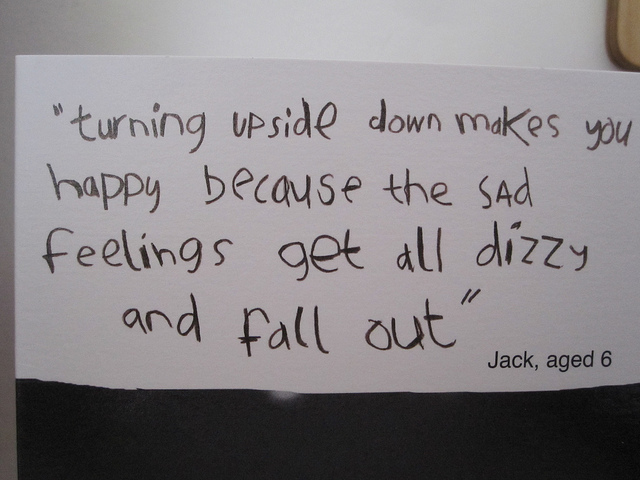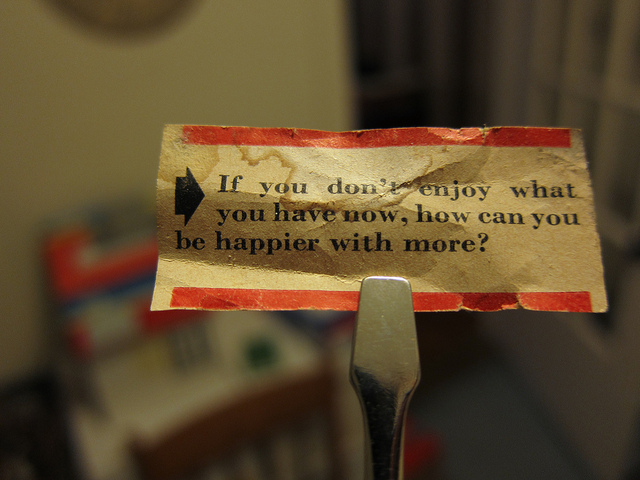
I’ve spent a long time pursuing happiness.
I don’t think that’s any different to anyone else. Isn’t that what we’re all striving for? To extend those select moments of pure bliss to not just select moments, but to all of our moments?
I have been actively stalking happiness since I was a kid. I remember catching myself in those very moments of happiness, and thinking, wow, here it is! Here is what everyone is talking about. But how do you make this very feeling hang around? And why is it that even if you try to recreate the very same circumstances and conditions that occurred during that moment, you never really experience the same delight again?
In my late teens and early 20s, the aggressive pursuit continued. I found myself travelling around the world, literally chasing my own tail, because I was sure that if I was in the right place, happiness would ensue. But it never did.
And at a certain point in my mid 20s, after having clocked up enough stamps on my passport to last a lifetime, I realised it was because “I” was always there. Whether I was in Australia, in Italy, in Spain, in Paris, in Egypt or in India, the “I” was always present. What was the common denominator in the unhappiness factor? The “I” element, I deduced.
I came back to Australia, and decided the “I” was the thing I needed to work on, not the situation, the place or the circumstances.
I turned toward that challenge.
As a neurotic writer, you can imagine this was a challenge indeed. I decided to apply some quantitative and some qualitative research. (It sounds like what it is. Quant is numbers—the concrete, masculine elements; qual is the touchy feely stuff, the feminine, the words and conversations.) This translated into a lot of reading about happiness and the science of happiness, and on the other end of the spectrum lots of conversations over red wine in the wee hours of the morning with friends, solving the world’s problems and the secrets to happiness.
We were all, it seemed, in pursuit of it.
As a result, I’ve spent a lot of time studying happiness. It’s strange isn’t it, that we apply so much rigorous, scientific testing to an intangible emotion, but we do. There are whole scientific movements dedicated to the pursuit of happiness.
Based on all these studies you could synthesize the core ingredients for happiness. It’s sort of like making a cake—if you have all these ingredients and you follow the recipe, then you’ll end up with a cake that looks like the one on the box.
But is it that simple? Can one simply make the happiness mud cake?
There are hundreds of studies and books out there, which set out the core ingredients for happiness. One of my favourites is 100 Simple Secrets of Happy People, by David Niven. Niven, a psychologist and social scientist, amalgamates a whole heap of studies and reveals the 100 elements that lead to happiness. If you were to follow them all, would you end up glowing with blissful happiness?
As a keen student who knows the value of practicing to achieve goals, I’ve often done so, but still, happiness on an every day, hour-by-hour, minute-by-minute basis alludes me.
The science of happiness often morphs into eastern religions. Suddenly we’re talking statistics like 92 per cent of individuals reported a positive shift in mood when listening to music of their choice (Hakenen, 1995), and then we’re talking about the Bhagavad-Gita and how we can apply elements from this ancient spiritual text to achieve every day enlightenment and happiness.
It doesn’t make sense to me. The juxtaposition of science and the spiritual as equal units of measure just doesn’t work.
But that didn’t stop me going down a path of yoga and meditation in the search of happiness. As a qualified yoga and meditation instructor, I’ve often provided advice on this very pursuit.
Interestingly the core elements in many eastern traditions and religions and what science tells you about happiness, are similar.
It boils down to: it’s not the situation, it’s you. You need to be controlling your mind, and the way you perceive the world.

It’s all about perception. Change your perception and happiness will ensue.
It’s harder than it sounds, especially when you’re living in the modern word, where on a daily basis you’re inflicted with a barrage of marketing. Buy this and you’ll be happy! It’s the catch-cry of the advertising industry. And look at how successful everyone is! And how much money they all have!
Ever heard that comparison is the thief of happiness? Well the marketing and advertising world capitalise on that.
But how to ignore all that buzz? Do you get rid of your television? Discard all your social media accounts? Avert your eyes when you see a billboard? Difficult to do, unless you move to some remote location in the Himalayas without access to satellite.
One of the most eye-opening books I’ve read recently is, The Happiness Industry, by William Davies. Davies looks at the relationships between business, finance, marketing and smart technology and how they’ve infiltrated our pursuit of happiness, or better yet, how they describe the narrative around happiness and what it looks like.
Have you ever considered if we describe happiness? Do you? Is it your definition or someone else’s?
Around us, a happiness and wellness industry has sprung up. And it’s big business. From yoga classes and festivals, to green juices and clean eating, to buying products, like candles and books and watches with emphatic phrases and words emblazoned across them.
Nourish! Believe! Magic! Now! They read.
Instagram accounts are full of photos of this paraphernalia. Suddenly you’re thinking, I need that spoon that has, “Happiness is…” written on it. I need it, don’t you see? It will make me happy!
Will it? Or is it just another thing we’ll buy, to try and fill the never-ending void in our pursuit?
The happiness industry is fooling the very notion of happiness.
As you unpick the happiness riddle, you become more riddled by it. You start asking, who defines happiness? Why are we even told that we’re supposed to be happy? Is happiness just a big business?
Maslo’s pyramid tells us that once we have our basic needs satisfied—food, water, shelter—then we move on to our greater needs like self actualization, being loved, etc. With all our primitive needs satisfied, we search for that greater understanding and realization.
But do we live in an age where not only the things that should make us happy, like the cars, the houses, the clothes, the perfumes, the rings, the job (the list goes on and on, it literally doesn’t stop, anything can be marketed) are defined for us, but also the very concept of happiness is defined by that industry too?
When I was a kid, I watched a John Marsden interview (an Australian author, famous for his Tomorrow, When the War Began series), where he was talking about happiness. He said something, which I’ve often revisited and remember to this very day (although not word for word, and because the internet wasn’t around back then I can’t find the actual prose). He said, something along the lines of:
A lot of parents say all they want for their kids is for them to be happy. But it’s an unrealistic expectation or goal. I say, I want them to lead full and interesting lives, with lots of experiences.
I’m not quite sure why I retained that specifically, but I think it was because I was simply shocked by it. Who wouldn’t want their loved ones to be happy? Why wouldn’t you want to be happy?
My pursuit of happiness and the rhetoric that surrounds it leaves me with this thought. There should be a personal indictment into the ideology of happiness. We should be reclaiming the concept of happiness, reprising it from the hands of marketing and industry, and those who bandy it around as a catch-all desired outcome for life.
We need to reclaim happiness.
Relephant Reads:
The Hard Truth about Happiness.
Happiness is a Monkey Trap.
Author: Lisa Portolan
Editor: Catherine Monkman
Photos: mik_p/Flickr, Christ Waits/Flickr








Read 1 comment and reply